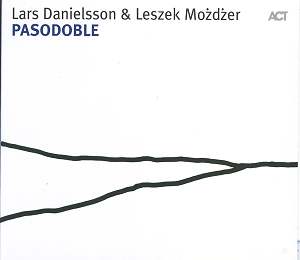1 Praying (Danielsson)
2 Fellow (Danielsson)
3 Entrance (Danielsson)
4 Prado (Danielsson)
5 Pasodoble (Danielsson)
6 Daughter’s Joy (Danielsson)
7 It’s Easy With You (Mozdzer)
8 Hydrospeed (Mozdzer)
9 Reminder (Danielsson)
10 Innocence 91 (Mozdzer)
11 Follow My Backlights (Mozdzer)
12 Eja Mitt Hjärta (trad.)
13 Berlin (Danielsson)
14 Distances (Mozdzer)
Lars Danielsson (bass, cello)
Leszek Mozdzer (piano, celesta, harmonium)
Recorded, mixed and mastered at Nilento Studios,
Gothenburg, Sweden, December 2006 / January
2007
This double act met not all
that long ago, at a concert in Warsaw, and
they have already released two successful
albums with Israeli percussionist Zohar Fresco.
The synergy between the two players is clear
right from the start, and I’ve relished almost
every moment of this stunningly played and
performed album.
The opening track is immediately
striking for the bass playing of Lars Danielsson.
There are many excellent bass players around,
but few whose intonation is as needle sharp
as Danielsson’s – in all registers. This is
one album where you can sit back and relax,
without having to put up with any of that
‘straining to get somewhere near the note’
we all too often hear. His cello playing is
genuine and expressive as well. Listening
to It’s Easy With You, you can hear
more comfortably classical lines and idiom
than someone like Oscar Pettiford, who played
it more like a mini-bass than a truly vocal
instrument. That is one thing I like
about Danielsson – he can be a musical chameleon,
sounding almost like a clarinet or successfully
subbing a sax, he really can and does sing
with his bass, laying down a solid bass line
where required, but phrasing lines like a
vocalist in numbers like Fellow, and
the atmospheric Berlin.
Pianist Leszek Mozdzer’s
expressive right hand is an important element
in the character of this album. Like Michel
Petrucciani, the melody is the most important
thing – the left hand has its own supporting
role. I appreciate the lack of wishy-washy
wandering around in most of his playing, but
this is also an aspect of the compositional
work, something which I will come back too
later. Mozdzer’s sense of colour is expressed
in the addition of celesta, which, overdubbed
alongside the piano, almost becomes an element
of percussion in the mix, like vibes or a
glockenspiel. Interesting effects arise where
the celesta notes echo those of the piano
like a shadow on clear water – it can sound
like a toy piano or a lonely voice plucked
out of a Shostakovich symphony. Mozdzer sounds
just a little less comfortable with the harmonium,
whose late-speaking notes trail those of the
piano a little at the end of Prado,
but I compliment him on finding an instrument
which is actually in tune! Damped strings
in the funky Pasodoble and the excellent
drive of Follow My Backlights are also
an effective part of Mozdzer’s armoury. Straight
piano playing remains central however, and
all of these effects are used sparingly and
with a light touch. I admire Mozdzer’s tasteful
inventiveness and imagination as much as his
admirable technique.
Some interesting effects
are thrown in here and there, with baths of
resonance and some electronic manipulation
of the player’s sounds creating variety, and
either atmosphere in a track like the folksong
arrangement Eja Mitt Hjärta, or
heightening the groove of the more rhythmic
numbers. As mentioned before, overdubbing
is quite an important aspect of the production
of some of these tracks, and the duo are often
in trio or even quartet with themselves, providing
some truly remarkable combinations – two basses
followed by bass and cello, for instance,
in It’s Easy With You.
The writing is, with the
exception of that one folk-sourced song, entirely
the work of the players, and is immediate,
approachable, and often strikingly beautiful.
Danielsson likes the kind of slinky progressions
and atmospheric effects which made Lyle Mays
that little bit more interesting in the ‘80s,
and adding in his traditionally Swedish soulfulness
bring us some fascinating harmonies – the
kind which can stick in your mind and keep
you awake at night. One of the quiet high
points is the disarmingly simple sounding
Reminder, which could almost be dropped
in as an aria during a Bach cantata. They’re
not always equally brilliant: the ‘Send in
the Clowns’ theme and subsequent meandering
of Entrance didn’t do great things
for me, but in general the standard is very,
very high indeed. Mozdzer also contributes
an acute sense of nuance and some genuinely
attractive material, though his work is less
through-composed, and frequently offers a
more improvisatory framework. If you want
to avoid the irritation of tiresomely ever-present
drummers then this album offers a substantial
and creative alternative. If you also like
genuinely well composed and performed jazz,
something in the order of Ralph Towner’s ‘Oregon’
group, or if like me you are a sucker for
the high production values of a label like
ECM, then this will tick all of the boxes
for you as well.
Dominy Clements
